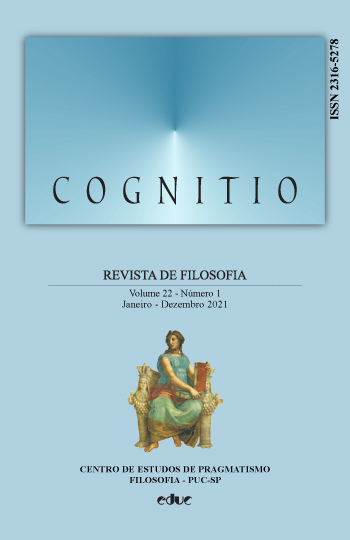Aptidão semântica e a abordagem de C. S. Peirce aos termos de tipos naturais
DOI:
https://doi.org/10.23925/2316-5278.2021v22i1:e53430Palavras-chave:
naturalism, meaning, natural kinds, reference, semioticsResumo
Neste artigo defendo uma interpretação pluralista para a teoria do significado de Peirce quando aplicada a termos gerais que fazem referência a tipos naturais ou, como recentemente estabelecido no debate contemporâneo,termos de tipos naturais
(TTNs). Conduzido por uma análise dos escritos de Peirce, podemos encontrar uma teoria confiável e promissora para esta ampla categoria de termos. Orientando-se por leitores privilegiados da filosofia de Peirce, duas posições principais são identificadas e comparadas por via do método pragmático. A partir das conclusões desta comparação, encontramos fortes razões para selecionar a posição pluralista moderada, enfatizando a teleologia dos agentes cognitivos em detrimento de causas finais. Esta leitura de Peirce não é apenas fortemente naturalizada, mas também se apresenta como uma abordagem instrumentalista à filosofia da linguagem. A leitura pretende lançar luz sobre algumas das principais reivindicações deste que é um autor estratégico, em especial, quando confrontado com a discussão contemporânea em torno dos TTNs. O tratamento de Peirce aostermos gerais
é enriquecido por novas pesquisas empíricas em ciências cognitivas e biossemiótica. Todo o trabalho tem uma dívida especial com estudos recentes em computação cognitiva que introduziram o conceito deaptidão semântica
para modelar um nível ótimo de abstração para produzir representações mais significativas em um determinado domínio ontológico, classificando objetos particulares de forma dinâmica e progressiva. Esta noção é introduzida para uma interpretação efetivamente evolucionária da teoria dos termos genéricos de Peirce e na exposição das vantagens desta estrutura conceitual.Downloads
Publicado
2021-12-31
Como Citar
Baiardi, D. C. (2021). Aptidão semântica e a abordagem de C. S. Peirce aos termos de tipos naturais. Cognitio: Revista De Filosofia, 22(1), e53430. https://doi.org/10.23925/2316-5278.2021v22i1:e53430
Edição
Seção
Artigos Cognitio
Licença
Copyright (c) 2021 http://creativecommons.org/licenses/by/4.0/

Este trabalho está licenciado sob uma licença Creative Commons Attribution 4.0 International License.









